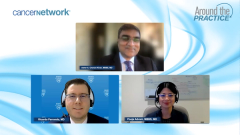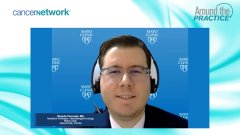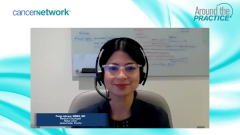
Currently Available Treatment Options for Patients With CLL
Mayo Clinic experts note that targeted therapies for chronic lymphocytic leukemia are generally superior to chemoimmunotherapy, with treatment choices tailored to patient comorbidities and preferences, and noting that real-world data mostly aligns with clinical trials.
Episodes in this series

Asher A. Chanan-Khan, MD, MBBS: Given that Dr Parrondo has been the lead in taking care of these patients at the Mayo Clinic in Jacksonville, let’s hear his thoughts on what approach he takes when such a case comes to him.
Ricardo D. Parrondo, MD: Absolutely. I would say of all those options, the only incorrect answer...is chemoimmunotherapy, due to the better understanding of CLL [chronic lymphocytic leukemia] disease biology and the subsequent explosion of targeted agents such as BTK [Bruton tyrosine kinase] inhibitors, and BCL-2 inhibitors. All of those therapies have been proven to be superior to chemoimmunotherapy. So it’s not wrong to do a single-agent BTKi. You could do a BTKi plus a CD20 antibody, such as obinutuzumab and acalabrutinib. You could do venetoclax plus obinutuzumab. And in this young fit patient, who does not have P53 mutation, you could also do a BTKi plus BCL-2 inhibitor. [There are] many options. You know, a lot of it is having a discussion with the patient. What are their preferences? Do they want time-limited vs continuous therapy? Do they want all oral vs IV [intravenous] plus oral? It’s an exciting time to be [a clinician treating patients with] CLL because there’s a multitude of options.
Asher A. Chanan-Khan, MD, MBBS: Fantastic. Dr Advani, [is there] anything in the history of this patient from a toxicity perspective that would raise a red flag? Are there perhaps options that should not be taken into consideration?
Pooja Advani, MD, MBBS: I think it’s so important to get a good history from patients. I think that there have been several sorts of risk scores that have been proposed for evaluating cardiovascular adverse events specifically for BTK inhibitors, which, as Dr Parrondo mentioned, have just taken the CLL scene by storm. Age, male sex, and existing valvular heart disease have consistently been found to be 3 risk factors that have come across as placing patients at an increased risk of cardiovascular adverse events. There are a lot more complex calculators that are available, but I think that oncologists and hematologists like to keep life simple. Gathering at least this basic history will be very important as you’re considering [patients] for BTKi therapy.
Asher A. Chanan-Khan, MD, MBBS: Thank you. Yes, that’s very aggressive in terms of thinking ahead about toxicity when you have so many options. I remember a few years ago we just had 1. We just had chemoimmunotherapy and everybody got the same therapy. And then BTK came on the scene and there was just 1. So it was just 1 option. So, yes, having multiple options does help. Now, Dr Parrondo, 2 important questions. First, what are the goals of treatment selection that you would have in such a case? And then, do you pay attention to selecting therapy based on predisposing risk factors of toxicity?
Ricardo D. Parrondo, MD: The goals of treatment for patients with CLL are to alleviate their constitutional symptoms, improve their cytopenias, and alleviate bothersome splenomegaly and liver lymphadenopathy. And ideally, to provide long-term disease control. Then [there are many] options that we have for choosing the therapeutic option tailored to the patient, their preferences, and also their comorbidities. So if a patient desires oral therapy, we have the BTK inhibitors. If the patient has extensive, uncontrolled cardiovascular disease, such as poorly controlled hypertension, recent MI [myocardial infarction], or uncontrolled atrial fibrillation, I would tend to avoid the BTK inhibitors, at least initially until those conditions are better controlled. In those cases, I may use a BCL-2 inhibitor plus a CD20 antibody. Another important factor is risk stratification, particularly if the patient has deletion 17p or p53 mutation. In my treatment paradigm, I like those patients to receive continuous BTK inhibitors. I don’t like time-limited therapy for those patients. And we have good data supporting the use of continuous BTK inhibitors for patients with p53 mutations. And we know that the outcomes of those patients are inferior with time-limited therapy. So those are the main factors that I use when selecting initial therapy for CLL patients.
Asher A. Chanan-Khan, MD, MBBS: There are clinical trial data, as you mentioned, that always guide us in the right direction and set the stage for what needs to be done. Then there’s the real-world evaluation: Is the clinical trial panning out of the controlled environment into the real world? And is the real-world experience more or less the same? I know there were recent data presented from Europe. We’ve looked at some data of ours from the United States. [Is there] anything that you would want to comment on, such as reports that perhaps the EHA [European Hematology Association] made or a statement from what was seen in the clinical trial? Is it translating in the real world or not?
Ricardo D. Parrondo, MD: Yes, definitely. There was an abstract presented at EHA in 2023 by The Lancet and other investigators, which was a real-world data multicenter study retrospective study evaluating treatment use patterns for first-line therapy of CLL. And some of the results were interesting. I think it confirmed that novel agent BCL-2 inhibitors and BTK inhibitors lead to superior outcomes compared with chemoimmunotherapy. You know, that confirms the results of all these clinical trials. But interestingly, the use of chemoimmunotherapy has not been completely removed from clinical practice. Some physicians continue to use chemoimmunotherapy or even single agent and anti-CD20 monoclonal antibodies despite the outcomes being worse with those strategies.
Newsletter
Stay up to date on recent advances in the multidisciplinary approach to cancer.








































